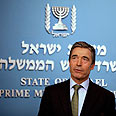
NATO chief: Israel, PA must take advantage of 'new dynamic'
Speaking at Herzliya Conference, General Rasmussen discusses Egypt uprising, stresses that Middle East stability, prosperity will only come from region itself. Ex-IDF intel chief: Army will have to change if Egypt becomes enemy
"We do not have all the time in the world," Rasmussen warned. "There is a new dynamic in the region. We must seize the opportunity to build on it."
Following his meeting with Prime Minister Benjamin Netanyahu and Foreign Minister Avigdor Lieberman, Rasumussen told the conference that stability and prosperity for the Middle East will only come from the region itself, if the countries choose that path. NATO, he added, can serve as a mediator in this regard.
He added that NATO would get involved in the peace process only if a concrete agreement was on the table and the two sides were to request its intervention.
Rasmussen expressed hope that the sides would reach a two-state solution.
Addressing the uprisings in Egypt and Tunisia, the NATO chief said the developments offer both dangers and opportunities for democratization. This is the time when countries need to put their trust in old allies and friends, like the trust between Israel and NATO, he said, adding that improving NATO's relations with Israel and other countries in the region is of the utmost importance.
"For almost 30 years Egypt has played a key moderating role in the region," said the head of the alliance of 28 North American and European member states. "It is important for all of us that it remains a force for peace and stability."
"I don't have illusions about NATO 's role about providing security in the region," he told the conference participants. "NATO cannot solve all the problems and it never intended to do so."
Rasmussen mentioned that in 1994 NATO promoted military cooperation between Israel and Arab nations, adding that this cooperation did not take place in a vacuum but rather as a direct result of the Oslo process.
Stability and prosperity could only come from within the region, he said, but added that pending a comprehensive Middle East peace settlement, this seemed "almost Utopia."
Rasmussen also enumerated the possible dangers the future holds, stating that NATO's new strategies make it clear that any distribution of nuclear weapons or apparatuses that are capable of carrying such weaponry threaten global stability. The speed with which the ballistic missiles are distributed is also a clear danger, he said, adding that over 30 countries are in the process of purchasing these missiles, some of which could hurt NATO member states.
Major-General (Res) Amos Yadlin, the former head of the Military Intelligence Directorate, told the conference that "if Egypt becomes an enemy of Israel once again, the order of the IDF's divisions and brigades will have to change."
However, he said, "This will not happen overnight. We still have time. A regime change takes time."
Yadlin explained that "even a regime that is hostile towards Israel understands there are many situations that are in between peace and a state of war – there is an interim state."
- Follow Ynetnews on Facebook










